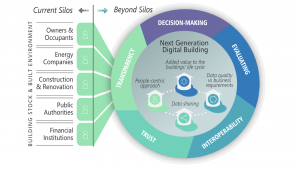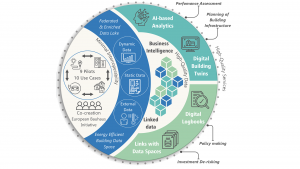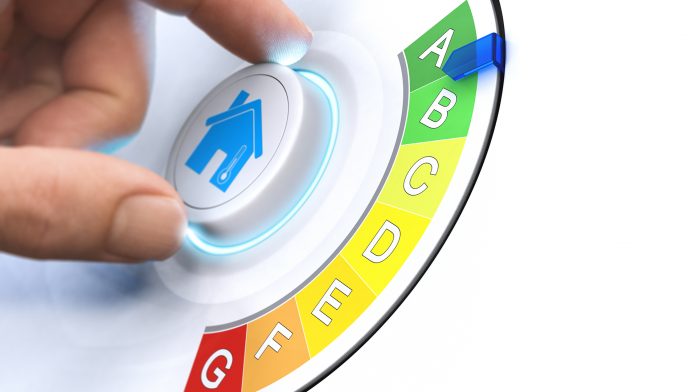The DigiBUILD Project combines Big Data and Artificial Intelligence tools with the aim of making the EU’s building stock climate neutral.
It might sound shocking to many that more than 75% of the European Union’s (EU) building stock is not considered energy efficient. The vast majority (75-90%) of these energy-intensive buildings standing today will still be in use in 2050, given that the construction rate is low overall. Low demolition and renovation rates also lead to an inexorably ageing building stock, with 75% of it built before 1990. Since the building sector accounts for nearly 40% of the total energy consumption in the EU, we shall move fast.
On the policy level, EU officials have raised the energy density reduction of the building sector quite high in their agenda. The EU’s climate policy is underpinned by a number of European Directives which set strict objectives on Member States for building stock energy performance. The building renovation is included as well as in several high-profile policy initiatives.
The EU must accelerate the number of deep renovations (with expected savings of 60% or more) and increase the rate of retrofitting (more than 2% per year) to improve the performance of the building stock, and at the same time reduce the pressure on the energy grids. In this respect, evidence-based decision support is required for sound planning on retrofitting. This is what the innovative DigiBUILD services will help with. The DigiBUILD Project is among the initiatives the European Commission (EC) fosters in order to address this challenging situation.
The crucial role of digitalisation in the building stock
Moving toward smart buildings equipped with digital technologies is fully aligned with the importance of data economy and prioritisation as set by the EC within the strategies ‘Digital Single Market’ and ‘A Europe fit for the digital age’.
Due to the increasing adoption of leading-edge Information and Communication Technologies (ICTs), such as the Internet of Things (IoT), Artificial Intelligence (AI), Distributed Ledger Technology (DLT)/blockchain and Big Data, more and more data is being generated within buildings.
Data concerns almost every aspect of the built environment, from how individuals and businesses use and interact with properties to how the building’s energy consumption and construction details are recorded and analysed to support informed decisions about construction and real estate processes. Data-informed decision-making and digital upgrading, such as energy conservation measures, can help upyield operational efficiencies at a low cost. The high-quality data services included in the DigiBUILD toolbox will provide support for the decision making process.
What is the vision of the DigiBUILD Project?
To accelerate and achieve the ambitious energy and environmental targets for a climate-neutral building stock, it is crucial to engage a large number of stakeholders from the building’s lifecycle: from conceptualisation and construction to refurbishment and demolition.
The inclusion of all related parties will ensure that the transition towards low-carbon and sustainable living is acceptable and feasible for all. But, how can the built environment be freed from the constraints of current silo thinking?
Traditional silo approaches, where the different building stakeholders access and manage only their own data, can be replaced by digital and smart buildings, merging heterogeneous data sources, and placing all the stakeholders at the core of these buildings in an integrated and comprehensive approach.


The overall vision of the DigiBUILD Project is to catalyse this much-needed transformation by using high-quality data and next-generation digital building services for assuring trust, transparency, and better-informed decision-making processes.
The development of data-driven services
The DigiBUILD consortium will deliver high-quality data-driven services for a digital and sustainable built environment, supporting the deployment of EU-wide framework for a digital building logbook. DigiBUILD is creating an innovative open, interoperable, and cloud-based toolbox to transform current ‘silo’ buildings into digital, interoperable and smarter facilities, based on consistent and reliable data. The strategic objective consists of designing, developing, and deploying a holistic people-centric framework across nine different pilots connected to ten use cases. The latter are clustered by theme into three groups: ‘Buildings Performance’, ‘Buildings vs Infrastructure Optimal Management’ and ‘Policy & Finance’. The use cases are currently being prepared to test the DigiBUILD services which include:
- AI-based services for finer-grained energy profiling and forecasting;
- Data-driven services for energy resources management;
- Data-driven energy and nonenergy services for enhanced comfort and wellbeing;
- Data-driven services for renovation roadmaps and energy efficiency financing; and
- Decision-making under uncertainty tools for efficient and climate-resilient buildings.
The DigiBUILD project is funded by the European Union under the research and innovation framework programme, ‘Horizon Europe’. The project consortium, led by Engineering Ingegneria Informatica, consists of 17 partner organisations with complementary expertise from the research and industrial area from 11 European countries representing the whole building value chain and more.

Views and opinions expressed are however those of the author(s) only and do not necessarily reflect those of the European Union or the European Climate, Infrastructure and Environment Executive Agency (CINEA). Neither the European Union nor the granting authority can be held responsible for them.
Please note, this article will also appear in the fifteenth edition of our quarterly publication.









